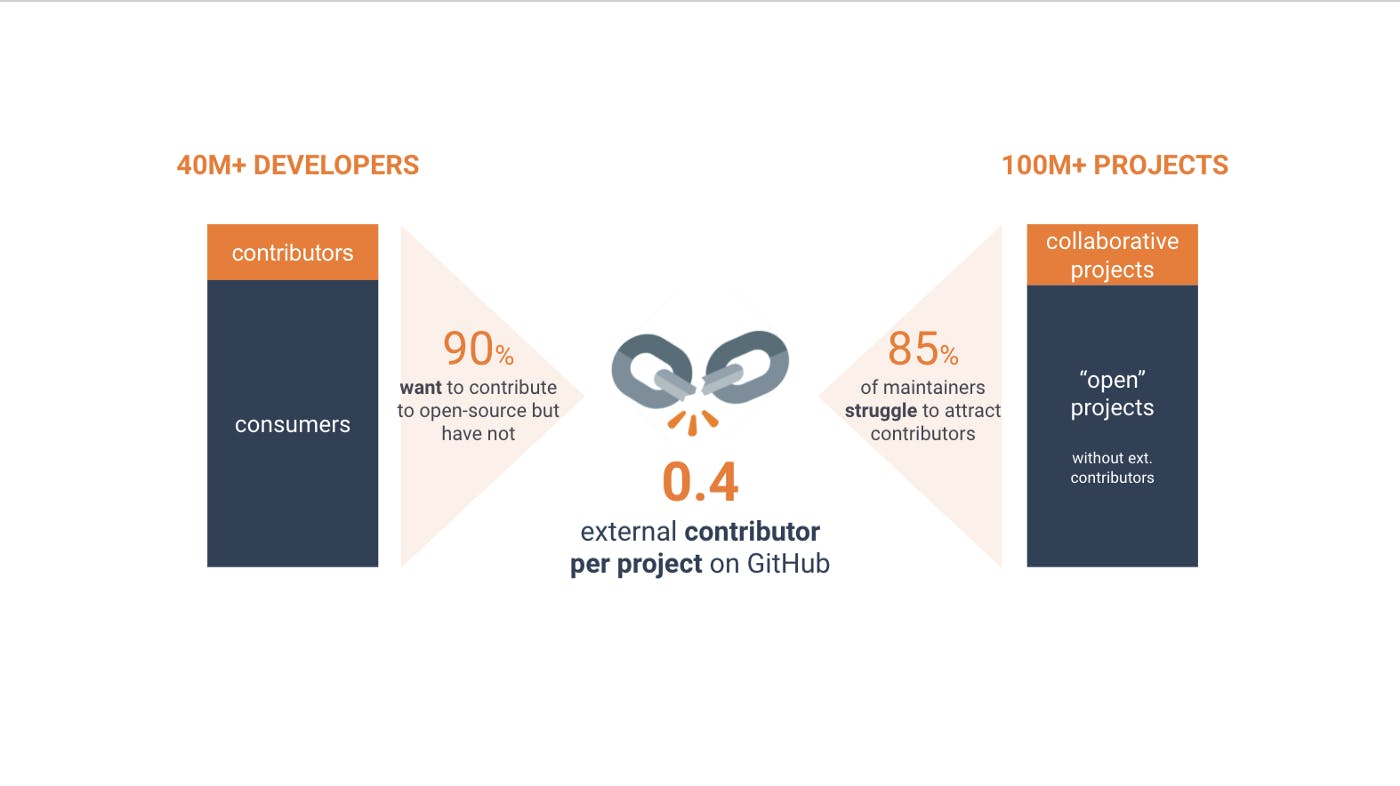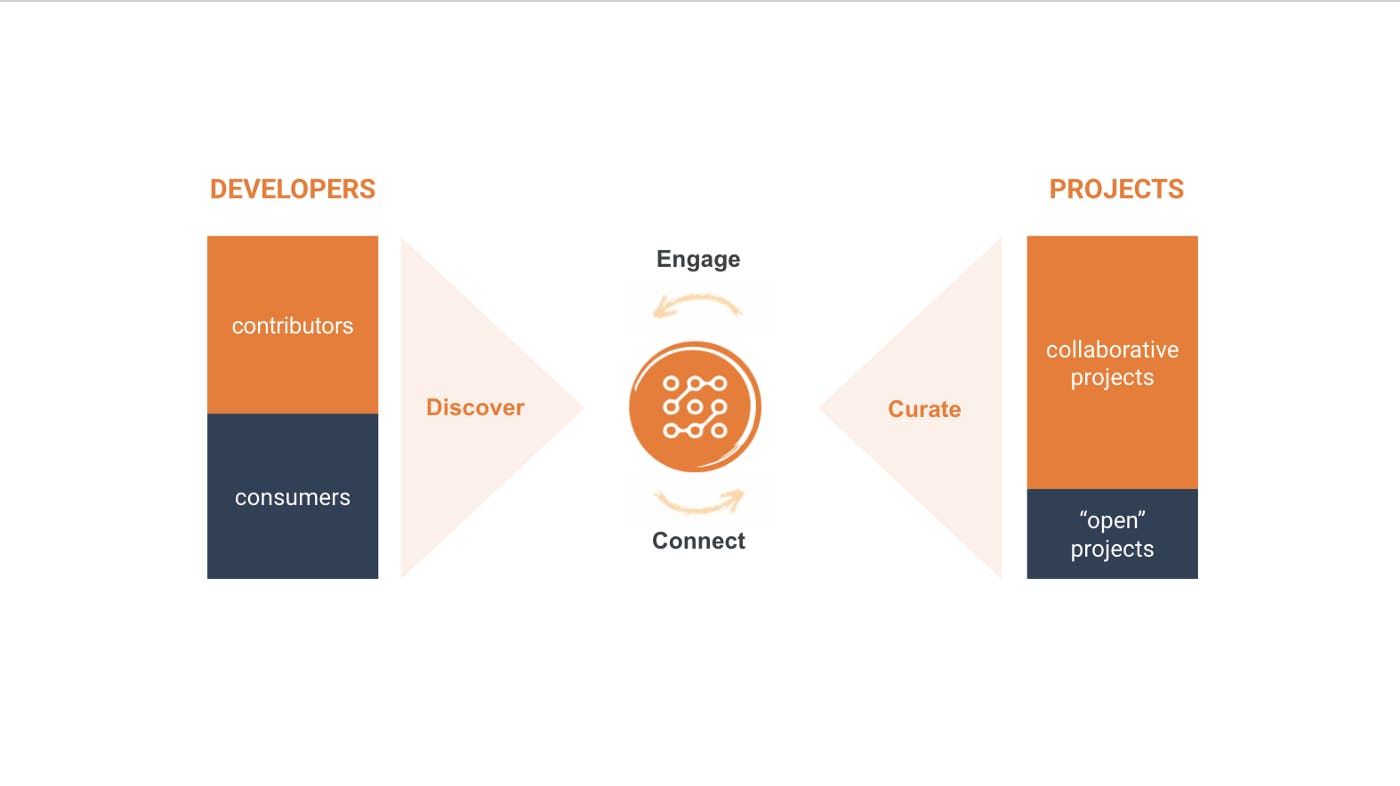From ‘consumer only’ to ‘all contributors’
Today, open source is integral to product development for a majority of companies. More than 90% of professional applications are created using open source components. It seduces every company that wants to build better software more efficiently. Those that contribute are gaining a competitive edge in their own markets as they get to know the technology at a much deeper level than they would by “simply” using the technology. That’s why modern businesses are no longer wondering how many OSS they should integrate but rather how much they want to contribute to OSS. The entire ecosystem is shifting from ‘consumer only’ to ‘all contributors’.
A two-sided problem
At a time when corporations are consuming open source software at a higher rate than ever, the average OSS project has less than one external contributor. It’s a huge pain for developers to know where they can be useful, and it’s incredibly hard for maintainers to find the help they need. Open source development relies on the work of a few, despite the fact that over 90% of developers are willing to contribute.

Where does this gap come from? Well first, no tool exists to filter projects and find the right opportunities at the intersection of contributors’ skills and interests. Finding a matching project is rare and finding the right issue fit is even harder. In other words, contributors spend more time looking for the right opportunity than getting involved. Even when a developer finds a good project match, they are often dissuaded by lengthy, opaque, and difficult onboarding processes that differ wildly from project to project. And this is only one side of the picture…
… Maintainers also have a hard time identifying the right talent. Most project owners don’t have access to sufficient tools or incentives that will support their work. They do their best to increase the visibility of their projects, and if they succeed, they soon feel overwhelmed with the management of a new community. This can lead to a “boom and bust” cycle, however, as many new recruits quickly disappear from the project. Matching specific contributors with their most pressing needs can quickly jam the desired outcome.
This two-sided problem translates into a poor contribution strategy for tech companies. Because there are too many high-value projects with sparse communities, it’s a complex challenge for companies to find and choose which projects to support. This results in having both in-house developers not incentivized to contribute and in-house maintainers not empowered to activate their communities.
Why companies should care
Open source contributions have a significant impact on companies’ visibility in the wider developer ecosystem, and also affect internal development velocity. Indeed, more contributions decrease risks and create opportunities for software development:
- It lowers the risk that a project maintainer quits causing a company to be stuck with an unmaintained project,
- It lowers the risk of a poor external image when in-house projects are no longer updated,
- It creates the opportunity to shape projects and add new features that can make a solution better, more robust, and more in line with the goals of the company,
- It creates opportunities for stronger branding,
- It creates opportunities for hiring talented developers….
At Ovio, we believe that more meaningful connections will enable the open source ecosystem to thrive. This is why we created a platform with a curated and personalized selection of open source projects to accelerate contributors matching and revolutionize the way open technology grows. This platform makes it easy for developers to find the right open source tasks and get involved in a project while providing maintainers the tools to attract tech talent and build their communities.

Ovio helps companies grow, manage, and showcase their open source program so they can attract and hire a more diverse team. Providing a platform where companies are empowered to build a robust contribution strategy results in positive outcomes:
- Matching talent with specific issues helps drive direct open source engagement.
- Showcasing open source contributions improves project visibility and accelerates velocity.
Providing OSS performance metrics enables the evaluation of both internal and external contributions and thus, stronger prioritization.

